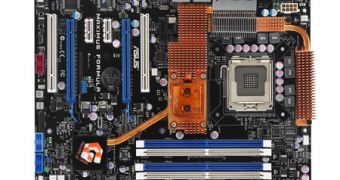Intel recently announced that its next generation of desktop high performance chipsets, the X38, will only support a 1333MHz processor bus speed and that a following iteration of that chipset, the X48, will reach the 1600Mhz operating frequency. As the launch date for the X38 chip draws near and mainboard manufacturing companies are rushing in with announcements concerning new products that are centered around the Intel chip, one of the most important motherboard producers, Asustek Computer just reported that it has other plans for X38.
Asustek Computer seems to consider that the Intel X38 mainboard chipset will be able to handle a higher processor bus speed than its producer officially announced as it plans to enable the 1600MHz speed. As Asus is well known and liked for the fact that its mainboards are operating in very stable conditions, it becomes clear that Intel is planning to squeeze the gaming and enthusiasts market segments for all they are worth with two products, the X38 and the X48, that are offering the same general features.
Asus already has on its Web site a number of mainboards that are centered around the Intel X38 chipset and those products ( P5E, P5E Deluxe, Maximus Formula) are listed as using the faster 1600MHz setting and not the officially supported 1333Mhz speed. As the differences between the two upcoming Intel desktop chipsets are negligible with the exception of the processor bus speed, it looks like Asus will soon take the lion's share from the enthusiast market segment.
The new range of X38 based Asus mainboards are offering native support for Intel's central processing units from the Core 2 Duo, Core 2 Quad, Core 2 Extreme families as well as other processors that are using the LGA 775 socket. Apart form the extended processor support, the new Asus line will also be able to accommodate both DDR2 and DDR3 memory modules while also supporting dual channel memory configurations and a host of proprietary Asus technologies that are used to boost performance and increase functionality.
Intel's X38 performance desktop chipset will, according to the news site xbitlabs, bring all the current technological goodies to its users as it supports dual channel DDR3 memory modules running at 1333MHz with Intel Fast Memory access, a PCI Express 2.0 bus that supports multiple card configurations and a number of other improvements that are aimed at boosting its performance rating along side with its overclocking capabilities. Its next iteration, the X48, will only bring to the table support for the 1600MHz processor bus and native support for DDR3 memory modules running at 1600MHz.

 14 DAY TRIAL //
14 DAY TRIAL //